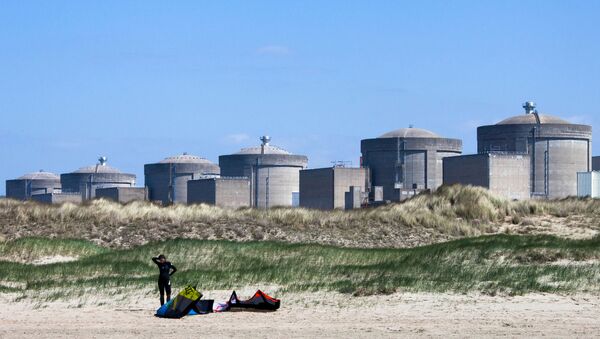On 4 June France’s Nuclear Safety Authority (ASN) issued a warning notice to EDF – a company which owns more than 50 nuclear reactors at 19 sites in France. According to the press release on ASN’s website, the predominantly state-owned energy giant will have to take urgent measures to protect its power station in Northern France’s Gravelines commune from the risk of a large-scale external explosion.
The reactors of Gravelines nuclear power station are located in the vicinity of Dunkerque LNG terminal and a large industrial area. EDF, which operates the plant, has admitted that reactors are vulnerable to external explosion and are in need of additional protection measures.
— Denis Bolotsky (@BolotskySputnik) June 17, 2020
In February this year the EDF has informed the authorities about a deviation in the functioning of a cooling system at Gravelines, which, in case of an accident outside the station, may interrupt long-term cooling for all of its 6 reactors. An accident of such kind – particularly an explosion near the facility, cannot be ruled out since the station is located next to a liquid natural gas (LNG) terminal and a large industrial area. And even though, according to EDF, one reactor at Gravelines has already undergone necessary refurbishing procedures, the company will continue working on protecting the remaining five reactors until the end of October of this year.
According to @Cha_Mijeon - International Relations Representative at “Sortir du nucléaire” (SDN) network, problems at Gravelines Nuclear Power Station are not unique: pic.twitter.com/b2WO3oPsIs
— Denis Bolotsky (@BolotskySputnik) June 17, 2020
Nevertheless, environmental activists are pessimistic about EDF’s estimates, and one of the reasons is the ongoing COVID-19 pandemic, which has hit the nuclear energy industry. According to Charlotte Mijeon, who is the International Relations Representative at French antinuclear coalition Sortir du nucléaire (SDN), EDF’s maintenance deadlines could be eventually reconsidered.
“Usually these operations are being done during the spring and the summer,” says Mijeon. “And since they were postponed, they will take place later, and it means that it will take place in winter and could be postponed by the end of the year, or even next year, or even by 2022”.
Besides environmental activists, the destructive impact of coronavirus pandemic on EDF’s maintenance schedule has also been stressed by Montel – a key information provider for Europe’s energy markets with its analysts saying that the outbreak “has shot the state-run firm’s reactor outage schedule to pieces fuelling fears of a supply crunch.”
However, EDF’s financial goals are probably of little or no concern in Belgium’s West Flanders province, which is less than 40 kilometers away from the Gravelines station, and locals are worried more about the risks of delayed reactor maintenance. They say that in case of an accident at the facility, dozens of Belgian towns, if not all of the country, will be in danger. Another concern is the lack of communication between French and Belgian authorities on the matter.
Belgian MP @WouterVermeersc on situation at Gravelines:“As far as we can figure out today,we only know this information from the press – the French press. So, we are a little bit worried that Belgium has not been informed neither on the federal level, nor on the provincial level"
— Denis Bolotsky (@BolotskySputnik) June 17, 2020
On 11 June, a week after ASN issued its notice to EDF, West Flanders media reported that even though the province’s governor Carl Decaluwé was reading monthly newsletter updates about the facility, he hasn’t received a lot of substantial information, including the ASN notice.
The right-wing Flemish Interest party was the first political force to sound the alarm in Belgium. And even though the party is in favor of nuclear power, according to Wouter Vermeersch, who represents Flemish Interest in the Beglian Parliament, nuclear safety is very important. So, Flemish Interest is now working on official inquiries on both provincial and federal levels:
“What we will do in the coming days – we are, of course, represented in the provincial council of Western Flanders, and there we will ask the governor exactly the same questions: “were you aware of this letter of default, and what will you do about it?” says Vermeersch. “Moreover, I’m also the Member of Parliament in Belgium, we will do the same now: we have handed in some questions to the Minister of Nuclear Safety. We asked him: has he been informed, is the crisis cell of home affairs aware, and FANC (the Federal Agency for Nuclear Control) of Belgium – has it also been updated on the situation?”
The Gravelines nuclear power station was commissioned in 1980, with the “youngest” of its 6 reactors being built in 1985. According to Oslo-based Bellona foundation, even though France is working on reforming its nuclear energy industry with a focus on replacing older reactors with next-gen ones, EDF has not been particularly quick in accomplishing these goals, with its first next-generation reactor set for commissioning in 2022, which is already 10 years behind schedule.
Gravelines is the seventh largest facility of the kind in the world and the largest in Western Europe. In 2017 the station has produced more than 31 Terawatt-hours of electric energy – which is almost 6 percent of France’s electricity production.



